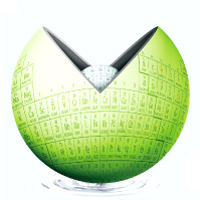
Published for geochemistry community from Geochemical Society of Japan.
Major elements and noble gases of the Jinju (H5) meteorite, an observed fall on March 9, 2014, in South Korea
Geochemical Journal, Vol. 50, No. 4, P. 315-325, 2016
ABSTRACT
The Jinju (H5) meteorite fell as four fragments in the Jinju area, Gyeonsangnam-do, South Korea, on March 9, 2014. The major element concentrations and noble gas isotopic compositions were determined for Jinju-1 and Jinju-2, stones of the first and second discoveries, respectively, by using X-ray fluorescence (XRF) analysis and noble gas mass spectrometry combined with total melting and stepwise heating noble gas extraction. The major element composition agrees well with that of equilibrated H chondrites. Very low contamination from terrestrial atmospheric noble gases was detected, which may be attributed to the rapid recovery of the stones within two days after the fall of the Jinju meteorite. A short cosmic ray exposure age of 2.4 My was obtained. The (U,Th)-He, and K-Ar ages are concordant at ca. 4.0 Gy, which suggests that no severe heating event occurred to cause a loss of He after the resetting at 4.0 Gy. Overabundances of trapped Ar and Kr, which were released at 800°C, were found in addition to “normal” Q gas of Ar, Kr and Xe at ≥1400°C. The low-temperature component could be explained by Ar and Kr supplied by an adjacent impact region that were trapped when the minerals of the Jinju meteorite were formed during cooling. The heavy shock event that occurred at 4.0 Gy might have produced the observed numerous vugs and vapor growth crystals in this meteorite (Choi et al., 2015) and could have supplied the Ar and Kr to thermally weak minerals.KEYWORDS
Jinju (H5) chondrite, observed fall in Korea, noble gas, elemental composition, cosmic ray exposure and gas retention agesSupplementary Materials(file)
https://www.jstage.jst.go.jp/article/geochemj/50/4/50_2.0418/_supplement/_download/50_2.0418_1.pdf
- Published : 2016-07-29
- Released on J-STAGE : 2016/07/31
- Received : 2015/11/17
- Accepted : 2016/02/15
- DOI : https://doi.org/10.2343/geochemj.2.0418
- J-STAGE URL : https://www.jstage.jst.go.jp/article/geochemj/50/4/50_2.0418/_article/-char/ja
- J-Online ISSN: 1880-5973
- Print ISSN : 0016-7002
- ISSN-L : 0016-7002
All Issues
- Vol.59, 2025
- Vol.58, 2024
- Vol.57, 2023
- Vol.56, 2022
- Vol.55, 2021
- Vol.54, 2020
- Vol.53, 2019
- Vol.52, 2018
- Vol.51, 2017
- Vol.50, 2016
- Vol.49, 2015
- Vol.48, 2014
- Vol.47, 2013
- Vol.46, 2012
- Vol.45, 2011
- Vol.44, 2010
- Vol.43, 2009
- Vol.42, 2008
- Vol.41, 2007
- Vol.40, 2006
- Vol.39, 2005
- Vol.38, 2004
- Vol.37, 2003
- Vol.36, 2002
- Vol.35, 2001
- Vol.34, 2000
- Vol.33, 1999
- Vol.32, 1998
- Vol.31, 1997
- Vol.30, 1996
- Vol.29, 1995
- Vol.28, 1994
- Vol.27, 1993
- Vol.26, 1992
- Vol.25, 1991
- Vol.24, 1990
- Vol.23, 1989
- Vol.22, 1988
- Vol.21, 1987
- Vol.20, 1986
- Vol.19, 1985-1986
- Vol.18, 1984
- Vol.17, 1983
- Vol.16, 1982
- Vol.15, 1981
- Vol.14, 1980
- Vol.13, 1979
- Vol.12, 1978
- Vol.11, 1977
- Vol.10, 1976
- Vol.9, 1975
- Vol.8, 1974
- Vol.7, 1973
- Vol.6, 1972-1973
- Vol.5, 1971
- Vol.4, 1970-1971
- Vol.3, 1969-1970
- Vol.2, 1968
- Vol.1, 1966-1967
Current Issue:
Stats:
Impact Factor: 1.6 (2024)
Submission to final decision: 9.6 weeks (2022)




